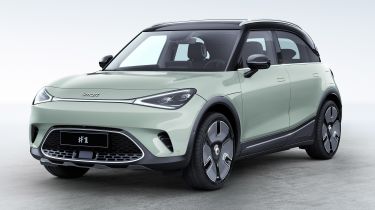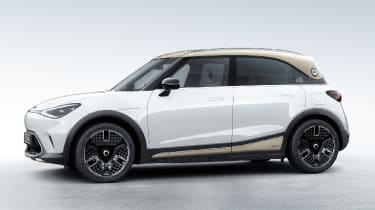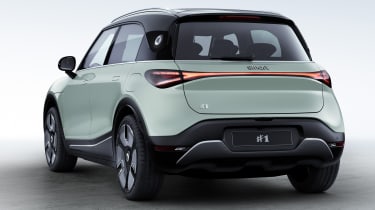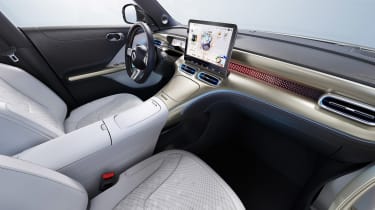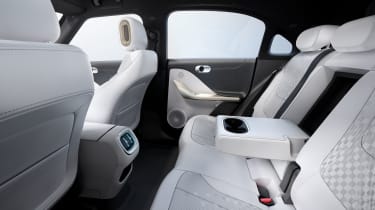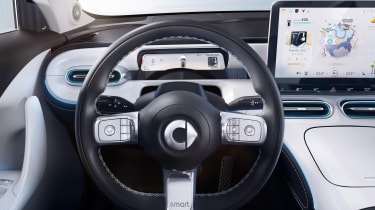New Smart #1 electric SUV goes on sale in December
Smart’s first crossover adopts an electric powertrain with a 273-mile range
- Up to 273 miles of range
- 12.8-inch central touchscreen
- Due on sale December 2022
Famous for its tiny cars, Smart has announced its largest model yet: the Smart #1 SUV. This compact electric crossover offers funky styling as well as a hi-tech interior and an impressive electric range.
 Top 10 best small electric cars 2025
Top 10 best small electric cars 2025
The Smart #1 is due to go on sale in December and will provide a more fashionable SUV alternative to other small electric cars such as the Renault ZOE and Peugeot e-208. First deliveries are expected to arrive in Summer 2023, when the #1 will join a growing lineup of supermini-sized electric crossovers that includes the Vauxhall Mokka-e.
2022 Smart #1: Launch Edition
Alongside regular models of the #1, Smart will be selling a limited-run ‘Launch Edition’ for a short period around the new car’s release. Limited to just 100 models for the entirety of the UK, these examples are expected to arrive before the rest of #1 models in Summer 2023.
Identified by its distinct bi-tone white and gold colour scheme, the Smart #1 Launch Edition will debut the new glass ‘Halo Roof’, which aims to make the car’s relatively compact cabin feel airier. Standard equipment will be plentiful too, with a list of kit that includes 19-inch ‘Prism’ alloy wheels, matrix LED headlights, leather upholstery and a 13-speaker Beats sound system.
Smart are yet to reveal pricing for the #1 Launch Edition, but we expect it to be the most expensive version of the new small EV – likely costing over £35,000.
Design and exterior
Being an SUV, the #1 is a large departure in terms of design from the brand’s previous models. The car’s roof is designed to look like it is floating and is stamped with the Smart logo on the C-pillar. Buyers can customise their #1 with a variety of two-tone body and roof colour combinations, and wheel sizes of up-to 19-inches are available.
To emphasise its SUV status, the Smart #1 gets plastic body cladding along the wheel arches and side skirts. A set of roof bars and skid plate-inspired trim pieces further add to its rugged look. However, this is all contrasted by an aerodynamic, curvy silhouette, flush door handles and coupe-style frameless doors.
Perhaps the most distinct exterior feature of the Smart #1 is its lighting design which is flipped and mirrored on the front and rear of the car. Both adopt a full-width light bar and incorporate pulsing indicator signals.
Interior and technology
Smart has gone to great lengths to make sure that the interior of this relatively small SUV feels light and airy; a panoramic ‘halo’ sunroof allows in plenty of light and a ‘floating’ centre console frees up space in the footwell.
The centre of the dashboard is dominated by a 12.8-inch infotainment touchscreen. This is said to incorporate futuristic 3D graphics and is bolstered by a 9.2-inch digital instrument cluster, plus a 10-inch head-up display. Smart #1 owners can access a variety of information via the new companion app and can even lock/unlock the car using their phone. Although it has not yet been confirmed, this whole setup may run a modified version of Mercedes’ slick MBUX operating system.
For those who are unaware, Smart is in fact owned by Mercedes and there are plenty of reminders throughout the interior. The sleek air vents are similar in design to those found on the new Mercedes C-Class, so is the curved centre console lid. This is no bad thing, however, as the Smart #1 is likely to feel much more premium inside than rivals such as the Peugeot e-2008.
The Smart #1 provides reasonable boot space for a car of this size, with 273 litres when the rear seats are reclined and a spacious 411 litres of room when they are slid forward. There is also a small ‘frunk’ under the bonnet, offering an extra 15 litres of room.
Powertrain and range
Despite being owned by Mercedes, the Smart #1 does not share its platform with the Mercedes EQA and EQB. Smart has instead brokered a deal with Geely, the company that owns Volvo, Polestar and Lotus, to use their Sustainable Experience Architecture platform; this will also underpin Volvo’s forthcoming small electric SUV, likely to be dubbed the XC20.
The Smart #1 boasts a 66kWh battery, mated to a 268bhp rear-mounted electric motor. This provides a range of up to 273 miles, which is more than the 260 miles or so that you can achieve in the EQA. The immediate torque from the electric motor should mean that the #1 will feel nippy around city streets, although heavy acceleration will swiftly deplete the charge. Thankfully, 150kW rapid charging will top up the Smart from 10-80% in just 30 minutes when connected to a public fast charger.
Those drivers looking to relax behind the wheel will be able to make use of the Smart #1’s advanced driver assistance features. Dubbed ‘Smart Pilot’, this system includes adaptive cruise control that can brake and accelerate in traffic jams, blind spot monitoring, adaptive headlights and autonomous parking.
What does this mean for car buyers?
The electric SUV segment is one of the most exciting right now, with several manufacturers entering this field for the first time. Smart has had little success in the last few years, with the EQ hatchback offering a limited 80-mile range at a relatively high price. Nevertheless, a spacious interior, decent range and low running costs all make the new Smart #1 an attractive proposition for families and company car drivers alike. In accordance with its more premium status, we expect the #1 to be a bit more expensive than rivals, starting from around £32,000.
Want an electric car but don’t want to spend the earth? Check out our list of the Top 10 cheapest electric cars
Recommended

New Subaru Trailseeker revealed as rugged electric SUV with 375bhp

New Subaru Solterra brings more range, power and polish
Most Popular

Suzuki’s new 10-year warranty is free – here’s how to get it

Omoda E5 targets rivals: now with zero deposit and APR
Tips & advice

Car dashboard warning lights: what does each symbol mean?

Electric car charging stations: public networks, charger types, apps and maps


